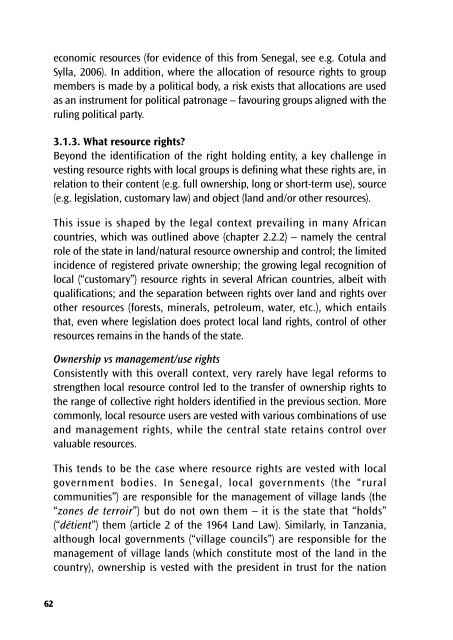Legal empowerment for local resource control
Legal empowerment for local resource control
Legal empowerment for local resource control
You also want an ePaper? Increase the reach of your titles
YUMPU automatically turns print PDFs into web optimized ePapers that Google loves.
62<br />
economic <strong>resource</strong>s (<strong>for</strong> evidence of this from Senegal, see e.g. Cotula and<br />
Sylla, 2006). In addition, where the allocation of <strong>resource</strong> rights to group<br />
members is made by a political body, a risk exists that allocations are used<br />
as an instrument <strong>for</strong> political patronage – favouring groups aligned with the<br />
ruling political party.<br />
3.1.3. What <strong>resource</strong> rights?<br />
Beyond the identification of the right holding entity, a key challenge in<br />
vesting <strong>resource</strong> rights with <strong>local</strong> groups is defining what these rights are, in<br />
relation to their content (e.g. full ownership, long or short-term use), source<br />
(e.g. legislation, customary law) and object (land and/or other <strong>resource</strong>s).<br />
This issue is shaped by the legal context prevailing in many African<br />
countries, which was outlined above (chapter 2.2.2) – namely the central<br />
role of the state in land/natural <strong>resource</strong> ownership and <strong>control</strong>; the limited<br />
incidence of registered private ownership; the growing legal recognition of<br />
<strong>local</strong> (“customary”) <strong>resource</strong> rights in several African countries, albeit with<br />
qualifications; and the separation between rights over land and rights over<br />
other <strong>resource</strong>s (<strong>for</strong>ests, minerals, petroleum, water, etc.), which entails<br />
that, even where legislation does protect <strong>local</strong> land rights, <strong>control</strong> of other<br />
<strong>resource</strong>s remains in the hands of the state.<br />
Ownership vs management/use rights<br />
Consistently with this overall context, very rarely have legal re<strong>for</strong>ms to<br />
strengthen <strong>local</strong> <strong>resource</strong> <strong>control</strong> led to the transfer of ownership rights to<br />
the range of collective right holders identified in the previous section. More<br />
commonly, <strong>local</strong> <strong>resource</strong> users are vested with various combinations of use<br />
and management rights, while the central state retains <strong>control</strong> over<br />
valuable <strong>resource</strong>s.<br />
This tends to be the case where <strong>resource</strong> rights are vested with <strong>local</strong><br />
government bodies. In Senegal, <strong>local</strong> governments (the “rural<br />
communities”) are responsible <strong>for</strong> the management of village lands (the<br />
“zones de terroir”) but do not own them – it is the state that “holds”<br />
(“détient”) them (article 2 of the 1964 Land Law). Similarly, in Tanzania,<br />
although <strong>local</strong> governments (“village councils”) are responsible <strong>for</strong> the<br />
management of village lands (which constitute most of the land in the<br />
country), ownership is vested with the president in trust <strong>for</strong> the nation

















